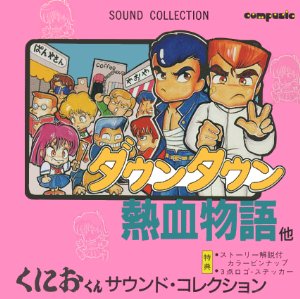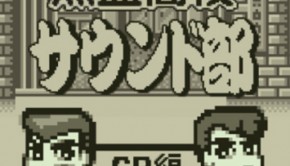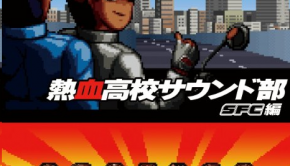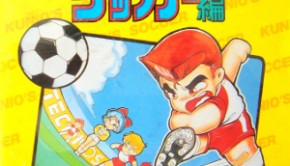Kunio-Kun Sound Collection
 |
Album Title: Kunio-Kun Sound Collection |
| Record Label: Apollon |
|
| Catalog No.: C228-5008 |
|
| Release Date: June 5, 1989 |
|
| Purchase: Buy Used Copy |
Overview
The 2008 Kunio-kun Music Collection was no doubt the most complete and full-fledged album that the series had to offer. It contained the music to all eleven Famicom games spread across four discs. It came to my surprise later on when I discovered that there was another similar compilation called Kunio-kun Sound Collection that had come out years before. This CD album is actually a re-release of three long out-of-print cassettes from the series. The original three tapes were Nekketsu Kouha Kunio-kun Sound Story, Sound Story Downtown Nekketsu Monogatari, and Sound Story Nekketsu High School Dodge Ball Club; which in turn were based upon Renegade, River City Ransom, and Super Dodgeball. Exactly what does “Sound Story” mean? That title refers to the original soundtracks being enhanced with higher-quality synth and sound effects being added in to the background. Some may enjoy the use of these sound effects, while others will wish purely for the music. Either way, how does the album stand on its own?
Body
To begin with, Renegade was already an average game with pretty average music. “Platform Scene ~ Clash” and “Brawl Inside the Train ~ One-on-One Against Riki” are the first area themes. While definitely fun and adrenaline-rushing tracks, both still feel quite repetitive. However, the enhanced synth in the remix version adds the extra crispness that the original versions lacked. Punching sounds and strings of Japanese dialogue can be heard in the background as well. These sound effects will remind the listener that this is a beat em’ up game after all and will also put them “in the scene” of the game.
The enhanced synth of “Yokozuka ~ Crush the Gang!!” is decent, reminding me of 1980s techno music. “Bike Chase Scene ~ Roaring V-Model Engine” and “Knockdown! The Yakuza Boss Sabu,” on the other hand, are both dreadfully repetitive tracks. Neither piece has anything good going for them in any of their sections. The sound effects also laughably drown out the music. “Theme of Confrontation” is a proud march, though like I’ve said before; it quickly falls into repetitiveness and monotony. “Ending Theme” additionally left me disappointed. Instead of the pop and techno styles previously utilized in this soundtrack, this piece is more orchestral and serious. This wouldn’t be so bad, except for the fact that the orchestra is poorly synthesized and completely out of place with the rest of the songs. Overall, the Sound Story soundtrack to Renegade does little to improve upon the already averageness of the original versions.
Super Dodgeball was the first sports title in the series and still remains a well-regarded favorite among fans. The soundtrack was a huge step-up from Renegade’s music, offering a variety of themes that reflected each country’s ethnicity. The re-arranged version of “Title ~Opening Theme~” is a proud march that even sound militaristic at times. “Stop! You Punk?!” is merely an 18-second repetitive theme with running sound effects and Japanese yelling towards the end. “Japanese Championship ~Confrontation with Rival Riki~” is a remixed version of the traditional Japanese song “Sakura Sakura.” The enhanced percussion line adds more punch and kick than the original. The added dialogue consists of grunts and yells from the players along with orders from the coach, signifying an intense game of dodgeball. “Advance to the World Series!!” is another short filler theme.
Moving to the specific country themes, “Theme of Team England” homages two Beatles songs “Hard Day’s Night” and “Get Back.” This new version runs slower than the original piece, though. It’s somewhat hard to explain but “Theme of Team Iceland” feels cold and desperate, signifying the desolate nature of the game’s icy stage. “Theme of Team China” feels oriental and somewhat reminiscent of Chun Li’s stage music from Street Fighter II. “Theme of Team Africa” is jungle themed, appropriately matching the stage location. The final track “Theme of Team America ~ Victory Ceremony” is proud and fast-paced, while the victory part is more, well, victorious; and echo’s the game’s main theme one more time. In short, the remix tracks for Super Dodgeball are more or less the same from their Famicom counterparts, aside from the higher quality synth.
River City Ransom is often considered by fans to be the pinnacle of the series and is regarded by many as the quintessential beat em’ up. The music was revolutionary for the time with its complex mixing and arrangement of melody and synth. The original 8-bit music was some of the best the series had to offer, but how does the remix stack up? “Opening ~Downtown Nekketsu Monogatari Theme~” is without a doubt the real highlight here. After beginning with some humorously delivered Japanese dialogue (likely taken from the original game’s intro), the piece goes into the game’s main theme. Much like the original theme, this piece is very rock-inspired; but this time relies on actual guitars. The use of live instruments makes this track sound similar to a radio jam section and I absolutely enjoyed every second of it. “Park/River Beach (Peace of the Moment)” just like the title implies, is a calmer piece. The enhanced synth makes the track sound strangely soothing and relaxing.
“Middle Boss Theme” speeds things up a bit, being brave and determined. “Hasebe ~Melody of Love~” and “Warehouse/Factory ~Kobayashi appears~” are brief and repetitive themes with the addition of a few short lines of Japanese dialogue. Unless you are a native speaker, these tracks will mean little to nothing. “Shopping Song,” is an acoustic BGM used when the player buys items and power-ups at the many stores spread throughout the game. The next four tracks are boss battle BGMs and they all follow the format of being rock-inspired pieces paired with fast paced synth. Luckily, they are all varied in their melodies. The most notable of these boss tracks is “Double Dragon Brothers Theme ~Ryuichi & Ryuji appears ~” with it being a hard rock version of the main theme from Double Dragon. These boss tracks also have Japanese dialogue, likely being speeches from the game’s villains. Japanese listeners will appreciate this more than anyone else for obvious reasons.
Finally, “Ending Theme (Unused),” is a proud and heroic finale to Kunio’s adventures. It combines jamming electric guitars, piano bars, and synth orchestra. Like the main theme before it, the ending theme is another highlight. The remixed music for River City Ransom does a lot of things right. The original legendary themes are left intact, and the enhanced synth and use of electric guitar only increases the awesome factor.
Summary
This album really has two hits and one miss. The music for River City Ransom is the strongest section on the disc and Super Dodgeball proves to be a fun experience as well. Renegade, on the other hand, is a rather bland re-release that has the same problems its original soundtrack had. It baffles me why this game was chosen to be remixed and not another title with a stronger soundtrack. The new synth varies from track to track, though River City Ransom has the best of the three. I would rank the overall synth as better than SNES and a notch below arcade. The sparse Japanese dialogue won’t mean anything to non-speakers, though.
Instead of hunting down the original cassette tapes, this album offers the perfect opportunity to have them all in one place with improved CD-quality sound. Even still, this collection is still pretty hard to find since it was released in 1989. Twenty five years later, a more comprehensive and still available release would be the Kunio-kun Music Collection from 2008. It really boils down to what the listener wants. If you want better synth, radio-drama styled mixing, and a rare collection of even rarer cassette tapes, go with this release. If you want a more complete collection and are a purist for the original sound, stick with the latter. As for this collection, it is overall a varied album with a few bumps along the way. Looking past Renegade, though, the rest of the soundtrack proves to be an enjoyable ride.
Do you agree with the review and score? Let us know in the comments below!
3.5
Posted on June 28, 2015 by Oliver Jia. Last modified on June 28, 2015.














